I recently had the opportunity to sit down with Bekah Harris of Dancing Cloud Great Pyrenees. Bekah is a hobby breeder of the Great Pyrenees breed. The first Dancing Cloud Great Pyrenees litter was born in 2014 though Dancing Cloud has been around in Chattanooga since 2005.
If you have wondered about the Great Pyrenees breed and if they might or might not be a good fit for your family or lifestyle, check out what Bekah has to say below.
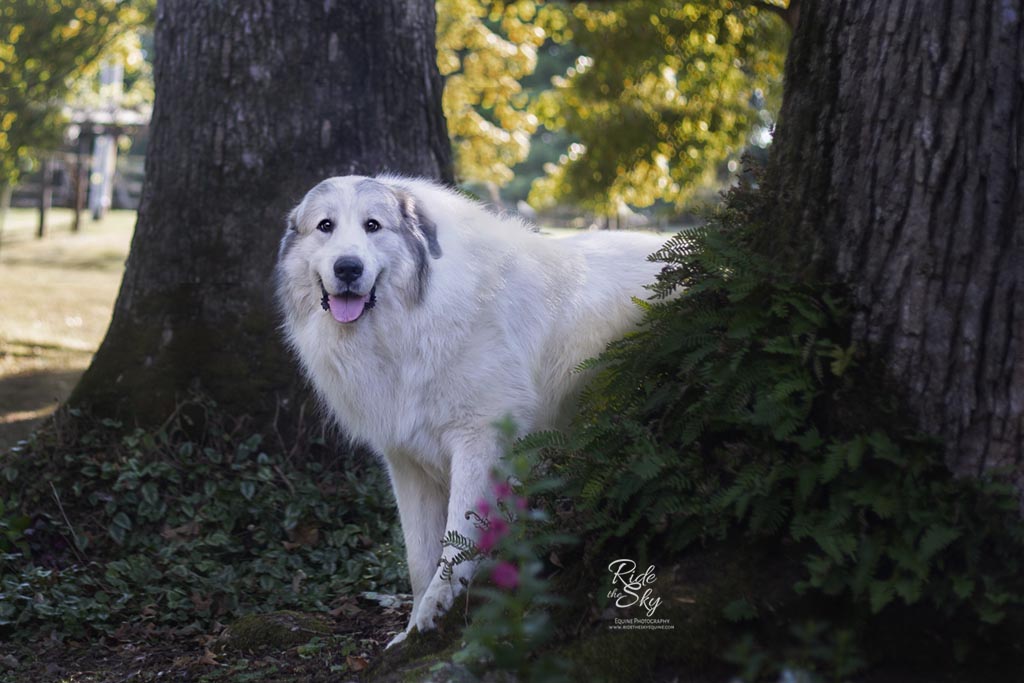
How did Dancing Cloud Great Pyrenees come into being?
It’s definitely a hobby, not a business as I don’t produce puppies to make money. You are lucky to break even after whelping expenses, stud fees, and veterinary bills!
I have bred 3 litters so far in hopes to produce puppies that meet the breed standard for conformation & temperament. Each litter’s goal was to maintain the integrity of the breed, improve upon the previous generation, and produce sound puppies for myself and the families who obtained a puppy.
My expectancy when planning a litter is to produce a puppy to keep, show, love, title, health test, and hopefully plan the next generation through.
What was it about Great Pyrenees that drew you to that breed specifically vs. something else?
As a teenager when I was deciding what I wanted to be my first purebred dog, I did a lot of research on many large breed dogs. I knew I wanted a dog from the Working Group and I knew I wanted a breed I’d feel safe with.
After narrowing my choices down, I met some breeds in person and instantly fell head over heels for Pyrs! I love their ability to be incredibly gentle and tender, but also fierce enough to defend their charges at all costs.
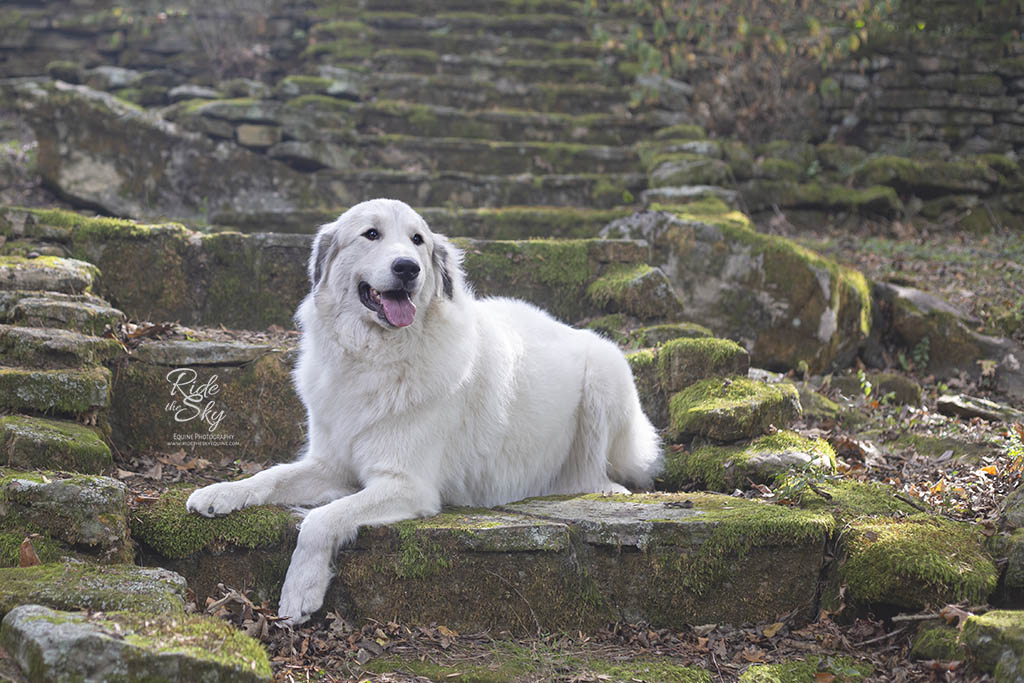
What is your favorite part of working with the Great Pyrenees breed?
We don’t get to compete in conformation as often as I’d like, but when we do, it’s definitely one of my favorite activities to participate in with my dogs! They enjoy it tremendously as well.
I also love the puppies! It’s exciting to watch them grow and interact with them. It’s also fun to share in the anticipation and joy that the new owner’s experience while waiting for their new puppy to join their family! I get just as excited choosing which puppy will remain with me!
What is your least favorite part of what you do?
Goodbyes!
Tell me what the Great Pyrenees breed is known for.
Great Pyrenees are traditionally bred to be LGD’s (livestock guardian dogs). They have been used for centuries to protect livestock against predators such as wolves, coyotes, and bears. As a result, they are an extremely independent breed! There is a common misconception that this breed cannot be trained, which is simply untrue! They are extremely intelligent, but are also free thinkers!
Their gentle nature makes them wonderful family pets, but they are definitely not as “easy” of a breed as some traditional family dogs (such as a Golden Retriever or Labrador). I would not recommend the Great Pyrenees for a novice dog owner or a family that does not have the proper time or ability to commit to them.
As far as performance activities, I do some Rally Obedience with all my Pyrs. They certainly don’t move as swiftly or precisely as some breeds, but we still have a lot of fun! A couple of my dogs also have done draft work which is another traditional task of the breed.
We have done pet therapy work for several years. Some are naturals at sharing their nurturing side, some are more aloof which can be a common trait in a guardian breed. Just as with people, some are outgoing, some are more reserved.
If an individual is looking specifically for a performance dog, they probably won’t have the easiest time teaching a Pyr to run an agility course or to dock-dive and they’d definitely need an abundance of patience as well as a great sense of humor!
If one is considering the Great Pyrenees as a pet, in your opinion, what are the things they should most consider?
The Great Pyrenees make amazing family dogs! They love children and are gentle, loving, and dedicated companions! They are not extremely active as adults, but do have a strong instinct to protect, which means they bark — a lot! If you live in a community with strict noise regulations, this probably isn’t the breed for you.
If you do not have a securely fenced yard or are not completely dedicated to leash-walk your Pyr, this isn’t the dog for you. This breed would traditionally cover acres of land in their role of livestock protection, therefore are prone to wander! They have earned the nickname “disa-PYRENEES”!
Unfortunately, the Great Pyrenees breed is sadly prone to bone cancer. As of now, there are no preventive measures for breeders to take against this disease other than removing dogs with known ailments from their breeding program.
Hip dysplasia can also be an issue. Testing the parents’ hips by X-ray examinations, ensuring pups have non-slip footing, leaving growing puppies un-altered until their growth plates close (18-24 months of age), good diet, and keeping excess weight off developing puppies are all huge steps that can be taken by both breeders and owners to reduce the risk of hip and joint issues.
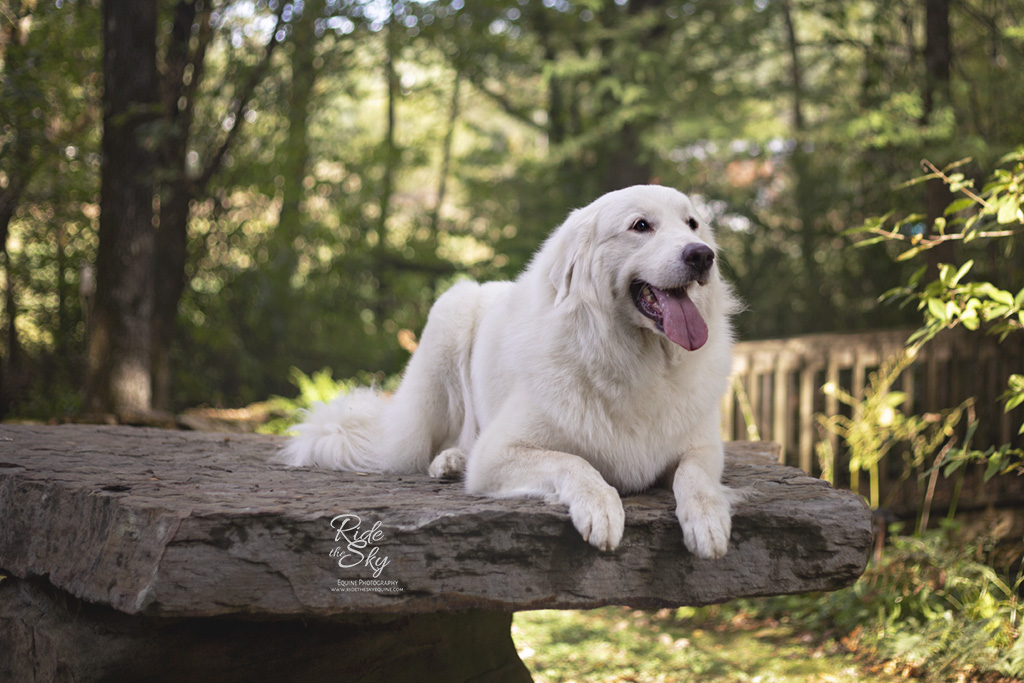
What do you think are the most important things to consider when looking for a new puppy or dog to join a family?
Choosing the right breed is very important! Sometimes the breed we are drawn to isn’t the appropriate fit for our family or home. Don’t choose your puppy (either mixed breed or purebred) solely by appearance/ color. Choose your dog based on activity level, size, temperament, and what will ultimately be appropriate for your lifestyle.
What are some things a person should be looking for to make sure the breeder is highly qualified and ethical?
It is important when looking for a breeder to ask a lot of questions.
“Why are you breeding this litter?”
This question should be met with openness about the breeder’s line, hopes & expectations for the litter. If a breeder is producing a litter solely to make money, chances are this isn’t the breeder you’re looking for. There should be a purpose behind the puppies being born.
“What health testing have the parents had?”
This is definitely a hot topic for me as I’ve heard many breeders state that testing isn’t necessary or that their dogs “have never had any health issues”. Answers like these simply won’t do! Ask for proof! Visit the Canine Health Information Center’s website and learn what tests are recommended for the breed you are interested in.
The OFA (Orthopedic Foundation for Animals) is also a great resource. They provide a free, searchable database of dogs who have had genetic testing done through their organization.
For one of my dogs to be considered for breeding, they must first pass the minimum OFA hip, elbow & patella testing as well as a DNA test for Neuronal Degeneration. If a breeder cannot produce proof of genetic testing (or if an OFA search for one of their dogs does not produce any results), I’d definitely walk away from that litter.
“How many litters do you produce?”
An ethical breeder will put a lot of effort into socializing their litters to help puppies become adaptable, confident adults.
Puppy Culture is an amazing program that lays out steps for breeders to achieve this goal and I would definitely recommend finding a Puppy Culture breeder.
If a breeder has multiple litters at once, there is a chance that they will not have the time to properly work with each individual through developmental stages and introduce training steps that will benefit both the puppy and the new owners.
Other Questions to Ask Breeders:
Other pertinent questions may include questions such as: How long have you been breeding? Are there any health or temperament issues in your line? Do the parents meet the breed standard? And even, May I meet the parents? Or at least the dam as many breeders don’t own their own stud dogs.
An ethical breeder will gladly answer all your questions!
Also, keep in mind that a fancy website or a lot of social media followers does not necessarily mean quality puppies so make sure to do your research.
What changes do you see happening in the dog breeding industry overall?
I think many breeders are becoming vilified. As the public sees rescue stories on the news and social media about puppy mills and careless breeders, it’s becoming a social norm to dislike ALL breeders. While there are bad breeders, there are also MANY good breeders whose sole wish is to preserve healthy, correct examples of the breed they love.
I’ve heard many times that breeding should be made illegal because there are so many homeless dogs in shelters. While shelter dogs certainly deserve loving homes, there is also a need for preservation breeders to continue their work. Without the dedication to preserve a breed, quality purebred dogs would quickly become a thing of the past. There are already many breeds that are nearing extinction. It’s a scary thing to think about.
If the animal rights extremists who wish to ban ALL animal breeding continue to befoul all breeders, the next generation could never know life with a purebred dog. Penalizing reputable breeders will not keep dogs out of shelters.
An ethical breeder will always take back a dog they brought into this world. I even have a clause in my puppy contract regarding this very thing. A reputable breeder will never allow a puppy they produced to knowingly be surrendered to a shelter or a rescue. They will do everything in their power to ensure they match their puppies with the appropriate families in the first place.
Many (especially those with children) want the predictability of characteristics that come with a purebred dog, as well as the lifetime support of a knowledgeable breeder. Adopt OR shop, both are perfectly acceptable options; no one should ever be shamed for the choice to obtain a dog from an ethical breeder.
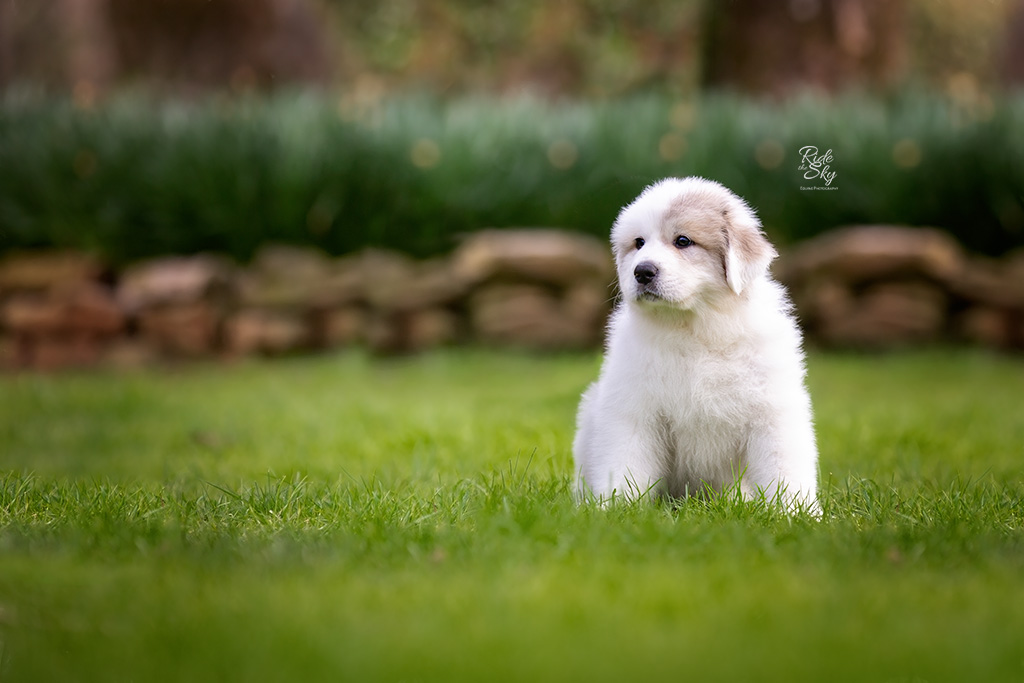
Do you have any type of guarantee when you sell a puppy?
I offer a replacement puppy if there is a life-threatening genetic condition that occurs with a dog produced by Dancing Cloud Great Pyrenees.
With a million choices out there, are there any specific brands of food or toys out there that you recommend? And if so, why?
I always recommend Kong toys. I think they are one of the greatest pet care inventions. On days where I’m particularly busy or where bad weather keeps the dogs inside all day, stuffing a Kong with goodies will keep them mentally stimulated (especially if frozen)!
Slip leads (Mendota or Lone Wolf) are definitely a “must-have” for a Great Pyrenees in my opinion. If your dog hits a stubborn streak, there is no way for them to back out of a slip lead like they could a collar or harness. It’s a great way to ensure that your friend on the end of your leash stays at the end of your leash!
Where can potential clients find Dancing Cloud Great Pyrenees online?
I don’t actually have a website. Dancing Cloud Great Pyrenees can be found on Facebook and Instagram. Or you can always email me at dancing.cloud@outlook.com!
Betsy Bird of Ride the Sky Equine Photography spends her days doing insane things to make animals look at her. Clearly, she’s desperate for attention. When she’s not celebrating the stories of the amazing equines and pets in her clients’ lives, she invests time and energy into perfecting her photography skills and growing her business, hanging with her favorite rescue dog, Nitro, and planning her next big adventure. She also tries to spend some time educating and entertaining her fans and potential clients by blogging and posting on social media about whatever catches her fancy at the moment.
Betsy is a Certified Professional Photographer (CPP) with the organization Professional Photographers of America (PPA). The CPP designation is held by fewer than 2,000 photographers nationwide and is a hallmark of consistency, technical skill, artistry, and professionalism. Ride the Sky specializes in on-location photography for equines and pets. Based in Chattanooga, TN, Ride the Sky Equine Photography works in Tennessee, North Georgia, and beyond.

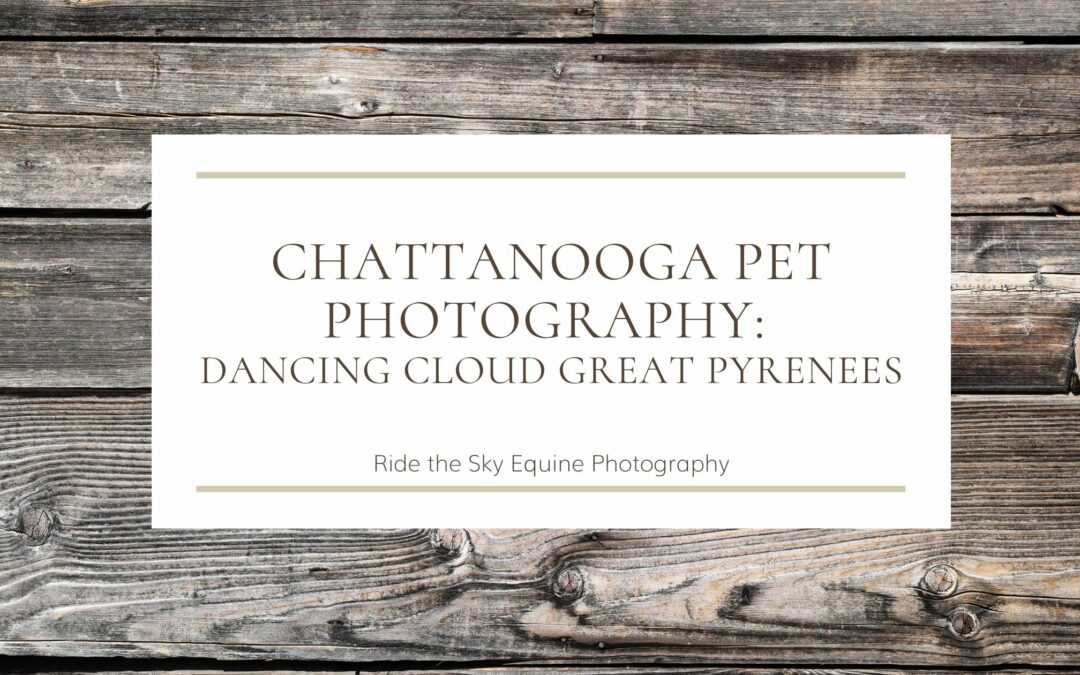
My husband and I really enjoyed reading about. DANCING CLOUD GREAT PYR.
We live in Boise, Idaho and We have a 7 yr old female Pyr named JOY that we love to death. She weighs 143lbs.
After reading this we realize how lucky we were. We literally grabbed one of four dogs that the breeder had left. JOY was 3 months old and was almost feral. She had no training or human handling and was living in a field with about 35 goats. No shots, no bath, no socializing..ect.
We had done our due diligence and knew the basics about pyrs since we had to euthanize our 11 yr. Old Newfy/golden mix. He topped out at 176 lbs. So we knew the space requirements necessary for LWG dogs. We thought we knew all about the barking ( N O T even close! ) we do have a fenced acre, and we have never let any of our furry family members off leash outside the yard or on walks.
Would love to know more about your breeding program. As hard as it is to think about, we know JOY will not be with us in a few more years. We would like to get another pyr when the time comes.
Thanks for your very informative artieat.
Jenny Kandler
Jenny,
Thank you for your lovely and thoughtful comments. If you would like to know more about the Dancing Cloud Great Pyrenees breeding program and be vetted as a potential home for one of their babies, you can find them on Facebook (they don’t have a website) under the name “Dancing Cloud Great Pyrenees”.
We have a almost 2 year old female named Luna, she is around 130lbs. I have a 12 year I’ll son and a 10 year old daughter, she is so gentle with our children as well as our cats. My wife’s parents have 2 smaller dog and she is amazing with them as well. I couldn’t have asked for a better dog. She can be loud, stubborn and she sheds a lot, but none of that compares to how wonderful she is. I don’t think I will ever own another breed. We adopted her around 3 months old from Taccoa/Stephen’s animal shelter through petsmart here in North Georgia. I highly recommend the breed for families with a little time and some yard space, even better if you can rescue one. They have so much love to give and they love to sleep on the sofa.